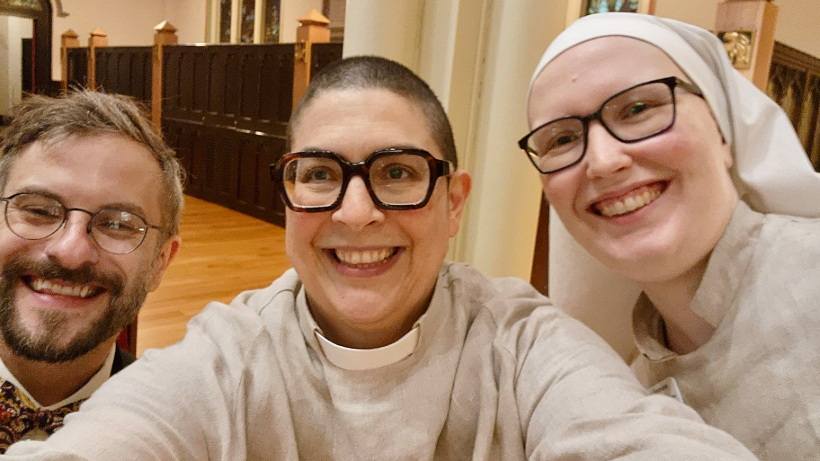
Haven Religious is an emerging religious community in Hartford, Connecticut that hopes to provide active service to the church and the city. There are three members: the Rev. Marta Rivera Monclova, Gregory Simmons, and Sean Glenn. Rivera Monclova and Simmons are novices in the Order of the Body of Christ, a traditional vowed religious community that exists within Haven.
Rivera Monclova is the leader. She wants to create something she sees as not prominent within the Episcopal Church: active religious life. “We’re very inspired by the early Victorian sisterhoods, who often were just women who started living together in a house and serving the church,” she said.
The community uses the Carmelite Rule of St. Albert, because it was written for a group of hermits who wanted to unite into a more corporate life. Because members can pursue different ministries, as opposed to having one shared apostolate, they felt like a rule emphasizing individual discernment and spirituality would work best. The community shares in daily Morning Prayer and Evening Prayer, acknowledging that sometimes ministry needs mean someone cannot attend.
Haven has been welcomed by the Episcopal Church in Connecticut. Haven chose Connecticut partly because it has a canon dedicated to intentional communities. The Episcopal Church requires six professed members before it recognizes a community as a religious order. Members found it appealing that Connecticut has regulations for smaller communities.
Rivera Monclova, who was ordained to the priesthood in January, is a curate at Grace Episcopal Church in Hartford. Simmons is assistant to the dean and event coordinator at the cathedral, and Glenn is its office assistant. One of Rivera Monclova’s dreams is for the community to provide supply service not just for preaching and the Eucharist, but for a parish’s other needs.
Grace Church recently distributed free turkeys through its food pantry, and if two additional people had helped, it would have made a big difference. This could be especially useful to parishes that struggle financially. “I’m seeing it more and more: the areas of the church that most need help and service are the least able to pay for it,” she said.
This financial struggle also affects younger clergy, especially in Connecticut, where many positions are only half- or quarter-time. Haven wants to provide an inexpensive residence for young priests. Priests might then decide whether to join the Order of the Body of Christ. Glenn is discerning whether he wants to become a vowed member, but whatever he decides, he can keep living there and remain part of the community.
“There’s a hunger among young people of faith for a residential Christian community,” Rivera Monclova said. She says Episcopal Service Corps it does a good job of catching young people on fire for ministry but then does not give them anywhere to take that fire besides ordination. “Surely we’re not saying the only call of dedicated service to the church is the priesthood,” she said.
While Haven more broadly welcomes everyone, the Order of the Body of Christ, is intended to be a vowed order following the evangelical counsels of poverty, chastity, and obedience. “We want to have traditional vows for non-traditional people,” Rivera Monclova said.
She considered existing women’s communities within the Episcopal Church, but decided they weren’t for her. “I visited one when I was 42, and I would’ve been the youngest sister by 20 years. That’s a calling somebody could have, but it’s not one I had. I’d still be starting something new, but in a container of something older, and I felt like that container would cause more friction than energy,” she said.
She wasn’t interested in joining a dispersed order without a discipline of celibacy because she wanted to be fully committed to service to the church and the community. “It’s a lens through which you see the world, when you have one person that’s your person. It’s why we take marriage so seriously. Even having it as an option would be a distraction,” she said.
“I want to be in a community where we’re all facing the same direction,” she added, comparing it to ad orientem worship, in which both congregants and the celebrant face the altar.
Haven is an Anglo-Catholic community. Simmons is helping coordinate Eucharistic adoration at Grace Episcopal Church during Advent. Haven members pray the Angelus corporately, but they modernize the language. But Anglo-Catholicism’s heritage isn’t just about chanting and incense but also about service to the poor.
Rivera Monclova hopes to begin celebrating the Eucharist for Church by the Pond, the Cathedral’s outdoor ministry that primarily serves homeless people. She also helps run Place of Grace Food Pantry at her parish. “The need in Hartford is huge,” she said. Before the COVID-19 pandemic, Grace’s food pantry served 100 to 150 households. Since then, it has risen to 350 households, and has given out 427 turkeys.
There are many direct service organizations in Hartford, and Haven wants to help them instead of creating new groups. On the other hand, secular social service organizations can’t provide for people’s spiritual lives. “Some of the people who are coming are hungry for more than bread,” she said. “Who around the parish has spiritual needs we could be addressing that we’re not?” She acknowledged that asking strangers what they want in a church is a particularly challenging form of congregational development.
Hartford is also home to Trinity College, which is historically affiliated with the Episcopal Church. Rivera Monclova has officiated at the college’s choral Evensong, and she hopes that as the community develops, there can be further partnerships between Haven and the college, especially with the schola.
Greta Gaffin is a freelance writer based in Boston. She has a master of theological studies degree from Boston University and a bachelor’s degree in economics from the University of Massachusetts Amherst.
Top headlines. Every Friday.
© 2024 The Living Church Foundation. All rights reserved.
